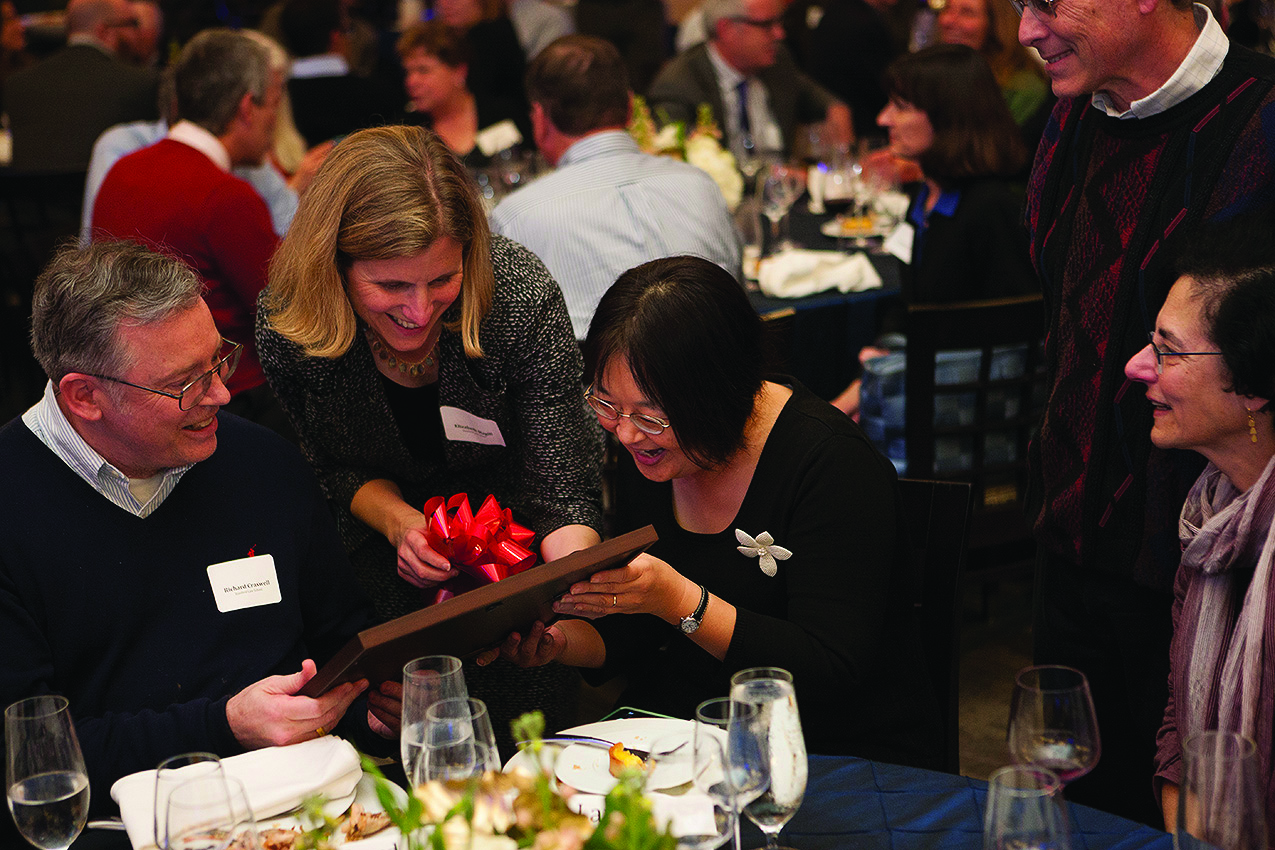Colleagues Honor Stanford Law School Professor Richard Craswell with Festschrift

Some of the nation’s most respected scholars in the field of contract law gathered at a “festschrift” symposium held at Stanford Law School over the winter quarter to celebrate the exceptional contributions of Richard Craswell, William F. Baxter-Visa International Professor of Law. “This is what we do when we want to honor a Hall of Famer. We get together and write papers,” explained M. Elizabeth Magill, Richard E. Lang Professor of Law and Dean, during the celebratory dinner. The event was co-sponsored by the law school and the Stanford Law Review.
The evening started on a light note with an original serenade in honor of Craswell’s quirky habit of setting his observations about contract law to music, ranging from sea chanties and drinking songs to themes from classic musicals and westerns. Seven colleagues sang, “I’ll Be Suing You” to the tune of “I’ll Be Seeing You,” accompanied by flute and guitar—with footnotes appended to lyrics shown on a big screen. Alison Morantz, James and Nancy Kelso Professor of Law, lauded Craswell as “the Cole Porter of legal academia with no significant rivals.”
Since arriving at Stanford Law School in 1998, and in prior professorships at the University of Chicago Law School and University of Southern California Law Center, as well as six years as an attorney with the U.S. Federal Trade Commission, Craswell has achieved recognition as an expert in all aspects of commercial law, including commercial paper and secured credit, and antitrust and consumer protection law. He is retiring from teaching this year.
The symposium, “Who Knows? Law in an Information Society,” included 25 leading scholars from around the country with expertise in law and economics, contracts, commercial law, antitrust law and related topics. Five new papers presented at the symposium will appear in the June issue of the Stanford Law Review.
A recurring theme throughout the festschrift was Craswell’s generosity in critiquing colleagues’ scholarship with their best interests at heart. “It’s as if he crosses over from his intellectual terrain to your island and spends time there,” explained Morantz, praising his “almost uncanny” ability to “offer insights as an insider.”
Noting that she first met Craswell at the University of Chicago Law School when she was on the entry-level job market, Magill said that during a private meeting with him to discuss her paper, “he was inside my head” and “showed a level of empathy for my intellectual framework that was exceptional.”
George Triantis, JSD ‘89, Charles J. Meyers Professor of Law and Business and associate dean, focused on Craswell’s academic contributions, crediting him with helping to keep the field of contract law dynamic. He said Craswell’s classic work, Contract Law, Default Rules and the Philosophy of Promising (1989), “may have produced the greatest impact in our field by clarifying and mapping for us the understanding of philosophical and economic perspectives on contract enforcement.” He commended Craswell’s “Against Fuller and Perdue” paper in 2000 as leading the field away from a dead end and opening up a bright, new framework for thinking about damages.
“A lively and productive academic field needs bomb throwers,” Triantis said. “But we also need people who come in, clear the rubble or crumbling structures, and show us the way to construct a sharper and more useful understanding of complex questions that really matter, in contracts and elsewhere.” He concluded, “As a most esteemed, charitable colleague to all of us, Dick, you have and will continue to be a source of intellectual rigor and light.”
Craswell was characteristically modest when he spoke briefly at the end of the evening. Citing Lou Gehrig’s famous retirement speech in which he focused on his good fortune, Craswell thanked his colleagues and said simply, “When it comes to the luck department, I really have been lucky.”
